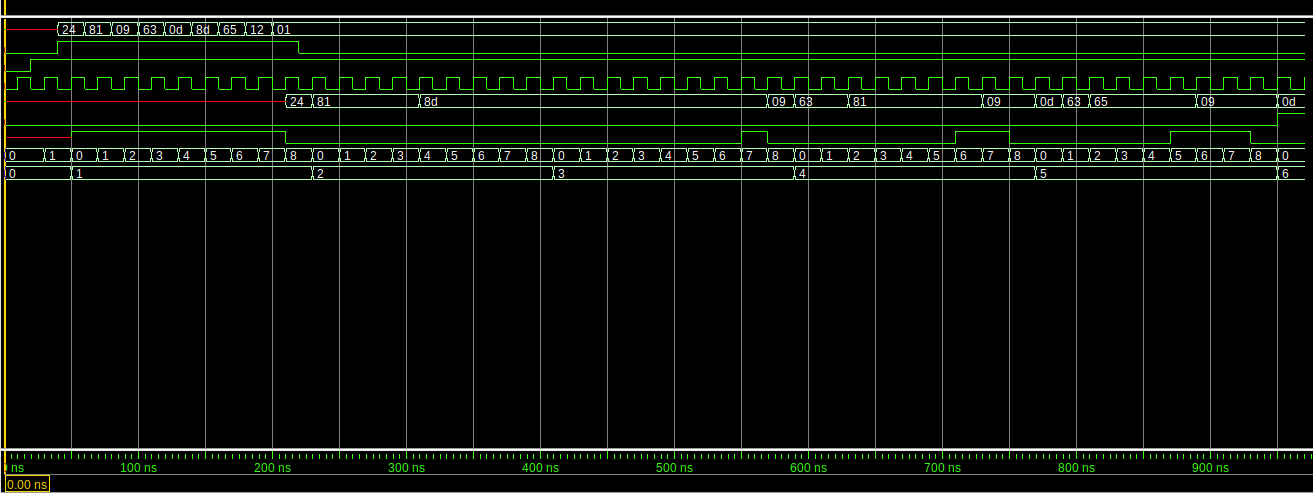I'm trying to build a median filter in Verilog using a comparator to sort out the highest pixel value and erase it, then sort out the next highest etc. until I have only 5 pixels left (I'm treating groups of 9 pixels) and the highest value of those is the median. I modelled this problem by having a initial state, one state to receive pixels and 5 states to find max. (Each state sorts between less bytes so at the end of my fifth state I'll have the median). Both code snippet below shows what I described above. Sorting module:
module MED #(parameter WIDTH = 8,
parameter NUM = 9)
(input [WIDTH-1:0]DI,
input DSI, BYP, CLK,
output [WIDTH-1:0] DO);
logic [WIDTH-1:0] R[0:NUM-1];
wire [WIDTH-1:0]MIN, MAX;
wire [WIDTH-1:0]D1, D2;
MCE #(.WIDTH(WIDTH)) MCE1(
.A(DO),
.B(R[NUM-2]),
.MIN(MIN),
.MAX(MAX)
);
assign D2 = (BYP) ? R[NUM-2] : MAX;
assign D1 = (DSI) ? DI : MIN;
assign DO = R[NUM-1];
always_ff @(posedge CLK)
begin
R <= {D1, R[0:NUM-2]};
R[NUM-1] <= D2;
end
endmodule
Whole filter:
module MEDIAN #(parameter WIDTH = 8)
(input [WIDTH-1:0]DI,
input DSI, nRST, CLK,
output [WIDTH-1:0] DO,
output logic DSO);
logic BYP;
MED #(.WIDTH(WIDTH), .NUM(9)) MED1(
.DI(DI),
.DSI(DSI),
.CLK(CLK),
.BYP(BYP),
.DO(DO)
);
//Compteur mod 8
//Le clk de sortie sera utilisé par la machine à états finis.
logic [3:0]counter;
always_ff @(posedge CLK or negedge nRST)
begin
if(!nRST)
counter <= 4'd0;
else if(counter == 4'b1000)
counter <= 4'd0;
else
counter <=counter+1;
end
//Machine à états finis
logic [2:0] state;
localparam INIT = 3'd0;
localparam S0 = 3'd1;
localparam S1 = 3'd2;
localparam S2 = 3'd3;
localparam S3 = 3'd4;
localparam S4 = 3'd5;
localparam S5 = 3'd6;
always_ff @(posedge CLK or negedge nRST)
begin
if(!nRST)
state <= INIT;
else
case(state)
INIT: if(DSI)
begin
counter <= 4'd0;
state <= S0;
end
S0 : if(counter == 4'd8)
begin
counter <= 4'd0;
state <= S1;
end
S1 : if(counter == 4'd8)
state <= S2;
S2 : if(counter == 4'd8)
state <= S3;
S3 : if(counter == 4'd8)
state <= S4;
S4 : if(counter == 4'd8)
state <= S5;
S5 :
state <= INIT;
endcase
end
always_comb
begin
if(state == INIT)
DSO = 0;
else if(state == S0)
BYP = 1;
if(counter == 8)
BYP = 0;
else if(state == S1)
BYP = (counter == 4'd8) ? 1 : 0;
else if(state == S2)
BYP = (counter > 4'd6) ? 1 : 0;
else if(state == S3)
BYP = (counter > 4'd5) ? 1 : 0;
else if(state == S4)
BYP = (counter > 4'd4) ? 1 : 0;
else if(state == S5)
begin
BYP = 0;
DSO = 1;
end
end
endmodule
This is the waveform I'm getting. Top row are my pixel values, bottom row is my current state and above that is my counter. Above the counter is my bypass signal, which would erase the max value and proceed to sort the next highest. What I wanted to have is have bypass set for when I have counter = 8 and state 2, then bypass set for counter = 7 and 8 when in state 3...
Is there any way to fix this or should I model my FSM differently (I'd like to keep the principle of sorting by highest value and erasing them, though).

